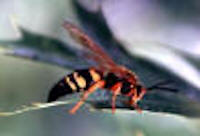 Green June bugs are also called fig eaters. This is because they
can eat soft-fleshed fruits such as grapes, plums, peaches and
apricots. In their larval stage they are a grub, but they don't
do a lot of turf damage like the normal June bug. They tend to
be in places high in organic matter, such as flower beds,
gardens, compost piles and under shrubs, so the grubs aren't
turf pests. Green June bugs are also called fig eaters. This is because they
can eat soft-fleshed fruits such as grapes, plums, peaches and
apricots. In their larval stage they are a grub, but they don't
do a lot of turf damage like the normal June bug. They tend to
be in places high in organic matter, such as flower beds,
gardens, compost piles and under shrubs, so the grubs aren't
turf pests.As for control, there is probably none necessary
unless you need to protect those soft-fleshed fruits. Then you
should follow the recommended spray program so you don't cause
problems with the fruit later on. The green June bug doesn't
sting or bite, so you can put them in the nuisance pest
category. The main damage they can do is fly into you, and that
can hurt. On the bright side, you are probably already
protecting things of value from the Japanese beetles, so you may
be covered.

Cicada killer wasps
The cicada killer wasp has returned. They are actually
considered beneficial insects because they control cicadas and
katydids. This wasp gets its common name due to the fact that it
hunts and supplies its nest chambers with a cicada, which
becomes a food source for the young wasp. Cicada killers are a
nuisance pest, especially when nesting in large numbers in a
play area or near the house. People get concerned because the
cicada killers resemble giant yellowjackets.

Cicada killers are about 2 inches long and black to red, with
yellow banded markings on the abdomen. The head and transparent
wings are reddish brown. They are not dangerous, but they are
intimidating.
Cicada killers are solitary wasps, with the female digging a
6- to 10-inch burrow (one-half inch in diameter) in the ground.
A pile of soil typically surrounds the entrance. The female
locates and stings a large insect such as a cicada or katydid
and then brings it back to the burrow. She places the insect
into a chamber and lays an egg on it; or sometimes she puts two
in a burrow but lays an egg on only one. She then covers the
burrow, digs another and repeats the process. The egg hatches
into a grublike, legless larva that consumes the paralyzed
insect. Full-grown larvae overwinter in the burrows, pupate in
the spring and emerge as adults during the summer, usually in
July and August.
[to top of second column] |
 Cicada killers are unlikely to sting a person. Wasp and bee
stingers are modified egg-laying devices (ovipositors), so males are
not able to sting. Females may sting if crushed, either by being
stepped on with bare feet or grabbed with bare hands.
Cicada killers are more common in areas with bare soil, so
mulching, planting ground covers or putting down sod can reduce
problems. Applying permethrin, bifenthrin or Sevin (some suggest the
Sevin dust gives better control) to the burrowed area should kill
females in high-traffic areas. Once females are gone, males leave.
In home yards, sandboxes can be covered with a tarp when not in use,
as this deters the wasps (and also keep cats out). Sand below
swings, jungle gyms or other playground equipment is a popular site
for the cicada killer. Raking the sand may discourage the wasps, or
you could use mulch instead of the sand. In extreme nuisance
situations, treatment of burrowing areas with a pyrethroid
insecticide or carbaryl may reduce problems.
Updates
Numbers of Japanese beetles are finally starting to decrease. The
peak seemed to be about a week ago. Damage will continue through the
end of August, with some beetles present until frost.
Many tomatoes are suffering from blossom-end rot, where there is
a leathery rot opposite the stem end. This is a calcium imbalance in
the plant, usually caused by uneven moisture conditions. Mulching
and watering once a week help. If you have container tomatoes, the
problem is much harder to solve. Things should even out on their own
for soil-grown tomatoes.
[By
JOHN FULTON,
University of Illinois Extension]
 |